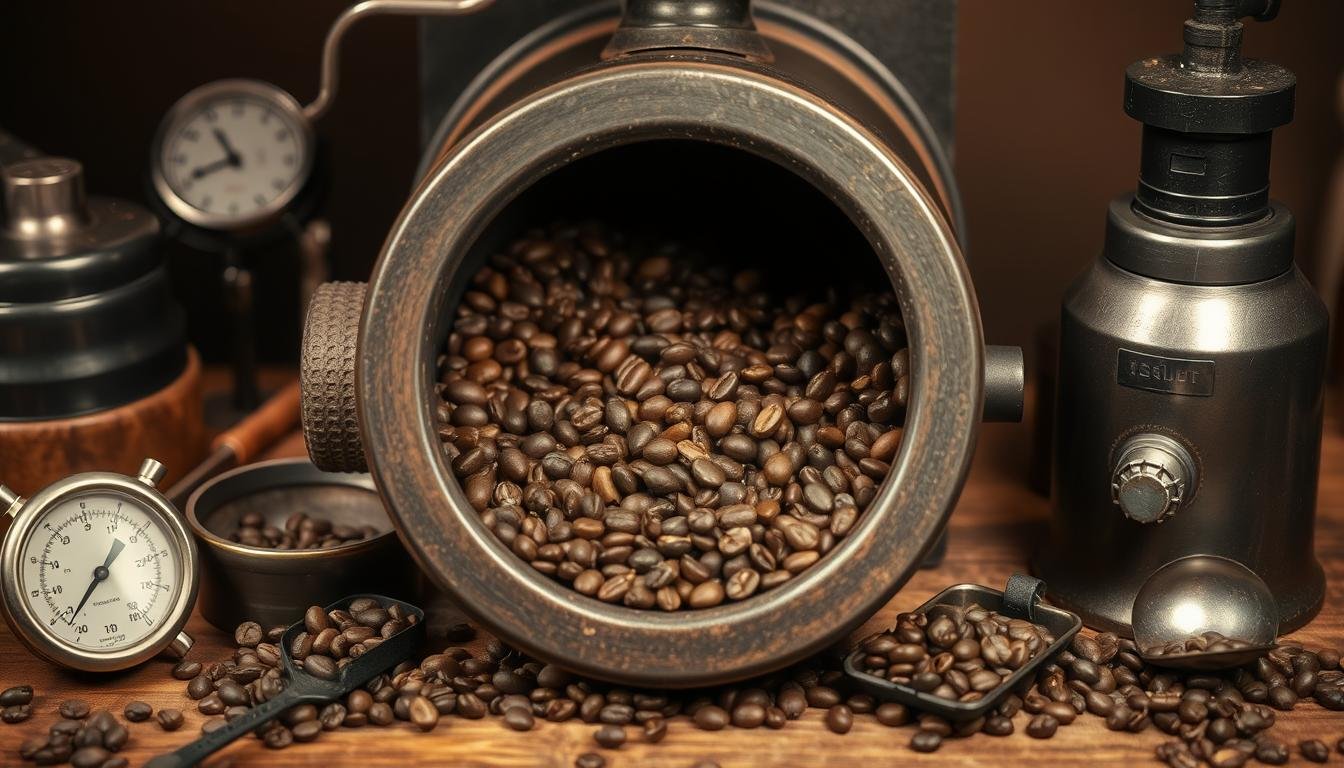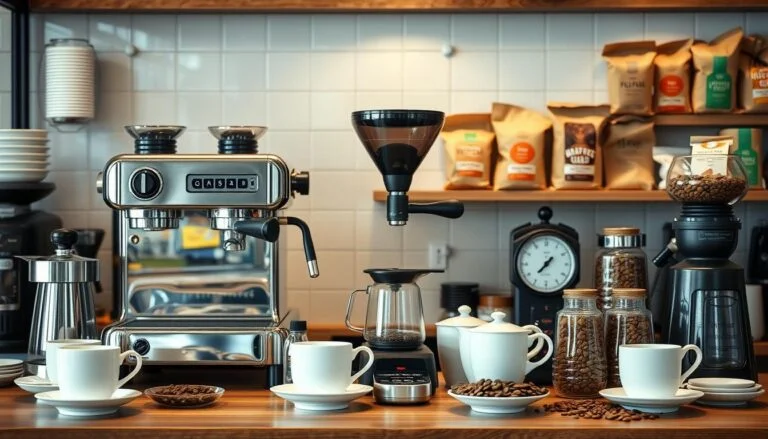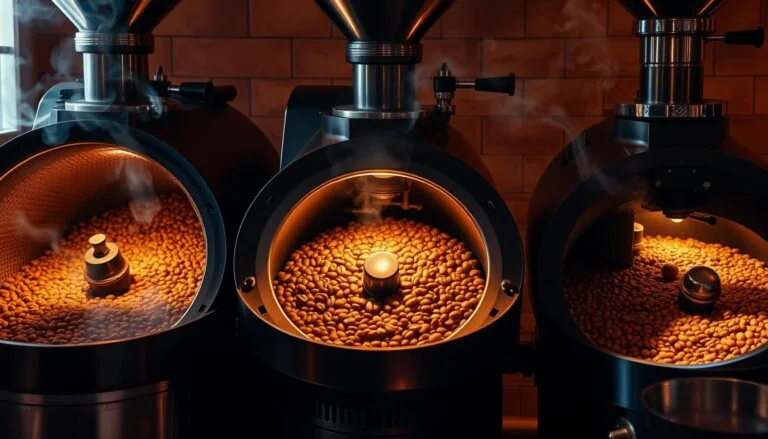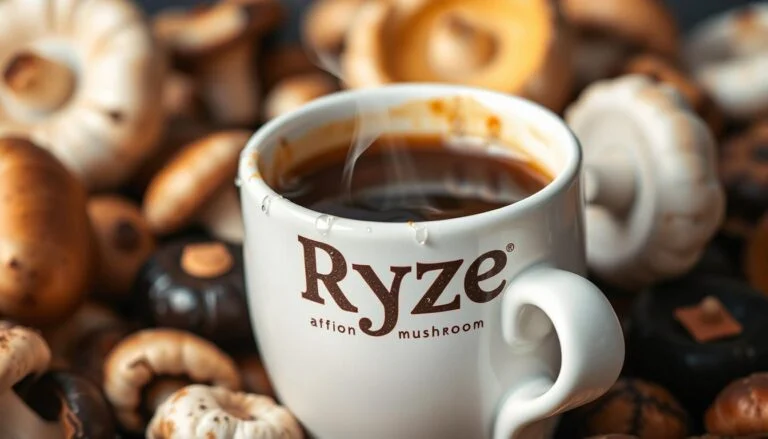In the world of specialty coffee, roasting is key. The right equipment can turn green beans into a flavorful, aromatic drink that coffee lovers adore. Whether you’re just starting or have years of experience, knowing the basics of coffee roasting can improve your brewing. It can also bring out new flavors.
Key Takeaways
- Coffee roasting equipment is crucial for creating the perfect cup of coffee, from home brewing to commercial production.
- Factors such as roast type, capacity, and temperature control are important considerations when choosing a coffee roaster.
- Artisanal roasters prioritize precision and control, while commercial roasters focus on industrial-scale production.
- Accessories like roasting aids and tools can enhance the coffee roasting process and optimize the final product.
- Understanding the different types of coffee roasters and their features can help brewers make informed decisions about their equipment needs.
Understanding Coffee Roasting Equipment
Coffee roasting equipment is key for any coffee business, big or small. Knowing the different roaster types and what to look for when choosing is vital. It helps brewers improve their coffee roasting.
Types of Coffee Roasters
There are many coffee roasters out there, each suited for different coffee businesses. Here are some common ones:
- Drum Roasters: These traditional roasters use a rotating drum for even heat and consistent roasting.
- Fluid Bed Roasters: These use hot air to roast beans in a column, giving precise control.
- Infrared Roasters: These roasters heat beans quickly with infrared radiation, creating unique flavors.
- Micro Roasters: Great for small operations, these roasters are ideal for specialty coffee shops.
Factors to Consider When Choosing a Roaster
Choosing the right coffee roaster involves looking at several important factors:
- Capacity: Think about how much coffee you need to roast, from small batches to large quantities.
- Temperature Control: A roaster with precise temperature control is key for consistent roasts.
- Energy Efficiency: Consider how much energy the roaster uses and its impact on costs and the environment.
- Ease of Use: Choose roasters with easy controls and interfaces to make roasting simpler.
- Aftermarket Support: Make sure the roaster has good customer support and maintenance services.
Understanding the different roasters and what to consider helps brewers pick the right one. This ensures they get the coffee flavor they want.
Artisan Coffee Roasters: Precision and Control
In the world of specialty coffee, artisan coffee roasters are the top experts. They know the art of coffee roasting inside out. They use advanced specialty coffee roasting equipment to bring out the best in each bean.
At the core of their work is the coffee roasting drum. This special equipment lets them control the roast with great precision. They adjust temperature, air flow, and roast time to get the perfect roast. This brings out the unique tastes and smells that make artisanal coffee special.
- Precise temperature control: Artisan roasters use special gear to control the roast temperature. This ensures consistency and lets them try out different roast styles.
- Customizable airflow: They can adjust the airflow in the roasting drum. This helps them highlight certain flavors and get the roast they want.
- Meticulous timing: By watching the roast time closely, they can bring out the best in each coffee bean. They find the perfect mix of sweetness, acidity, and body.
This focus on detail leads to coffee that’s truly amazing. It’s a mix of art and science, showing off the roaster’s skill in every sip. For coffee lovers, drinking an artisan-roasted cup is a big deal. It shows the power of precision and the drive for perfection.
| Feature | Benefit to Artisan Roasters |
|---|---|
| Precise Temperature Control | Enables consistent and customizable roast profiles |
| Customizable Airflow | Allows for accentuation of specific flavor notes |
| Meticulous Timing | Unlocks the true potential of each coffee bean |
“The true art of coffee roasting is in the nuance – the ability to coax out the most captivating flavors and aromas from each unique bean. That’s where an artisan roaster’s expertise truly shines.”
Commercial Coffee Roasters: Industrial-Scale Production
In the world of coffee roasting, big machines are key for large-scale operations. These machines are used by cafes, coffee shops, and specialty roasters. There are two main types: drum roasters and fluid bed roasters.
Drum Roasters
Drum roasters are a top pick for roasting coffee on a big scale. They have a drum that turns the coffee beans for even heating. This method is great for businesses that need to roast a lot of coffee.
They’re known for their precise temperature control and customizable roast settings. This makes them versatile for commercial roasters.
Fluid Bed Roasters
Fluid bed roasters roast coffee differently. They use hot air to keep the beans suspended and heated evenly. These machines are praised for their energy efficiency and consistent roasts.
They’re also compact and have precise temperature control. This makes them a good choice for businesses looking to improve their production.
| Feature | Drum Roasters | Fluid Bed Roasters |
|---|---|---|
| Batch Size | Larger | Smaller |
| Roasting Approach | Gentle tumbling | Suspended in hot air |
| Temperature Control | Precise | Precise |
| Energy Efficiency | Moderate | High |
Choosing between a drum or fluid bed roaster is important for businesses wanting to grow their coffee production. Both types of equipment are key for making high-quality, fresh coffee beans.
Essential Accessories for coffee roasting equipment
There’s more to coffee roasting than just the basic gear. Essential accessories and tools can make a big difference. They help with cooling, sorting beans, and monitoring temperatures. These items make sure your coffee roasting is top-notch and consistent.
Roasting Aids and Tools
Cooling trays are key for cooling beans after roasting. They help beans get to the right temperature for storage or packaging. Bean sorters remove impurities and make sure beans are all the same size. This helps with even roasting.
Temperature probes and digital displays let you watch the roasting temperature in real time. This helps you adjust your roasting to get the perfect flavor. With roast profiling software, you can track, analyze, and improve your roasting methods. This leads to more precision and control in your coffee making.
These digital tools let you try new things, keep track of your results, and get better at roasting. They help you make sure every cup of coffee is amazing for your customers.




